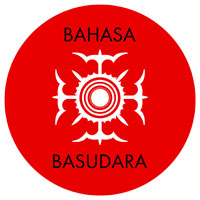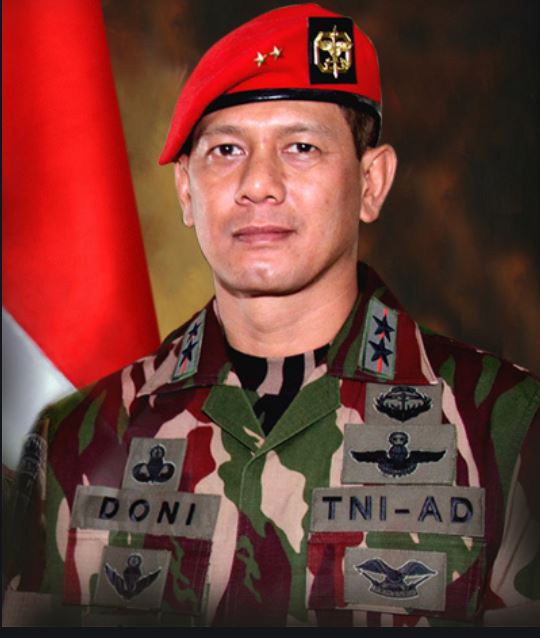“Luar biasa” were the words that kept coming up in the chatbox at the bottom of the screen during Pak Doni’s webinar. Our fourth Bacarita dari Timur webinar on Friday 11th September was different in many ways. Here was a man, who unlike our previous speakers at the webinars, had no Moluccan blood running through his veins. But he expressed such passion and commitment for Maluku and its people, that he could easily have been mistaken for one.
Unlike some military and governmental people who usually
have an officious demeanour, Pak Doni
(his official title is: Lieutenant General of the Indonesian Armed
Forces) revealed another side; likeable and serious, knowledgeable, and great
sense of humour. With Jakarta heading for another potential lockdown, the day
before the webinar, the organisers weren’t sure if Pak Doni was able to attend
at all, as he is the current Chief of the Coronavirus Disease Response
Acceleration Task Force.
Born in Cimahi, West Java, Pak Don’s career path in the military has been very impressive. After graduating from the Indonesian Military Academy and the Indonesian Army Command and General Staff College, he worked for the Presidential Force of Indonesia and the Indonesian Special Forces Group, before he became the Commander Kodam XVI/Pattimura (Regional Defence Command), a vast territorial area of two provinces; North Maluku Province and Maluku Province with its numerous smaller districts.
Not surprisingly the local Moluccan government was at first sceptical (like they were with many of the non-Moluccan military commanders before Pak Doni), but this soon changed as he brought many positive changes to the region. This was a man who (during his command in the Moluccas) wouldn’t carry weapons and who took it upon himself to create peace and security in the Provinces. He used to say: “I am only armed with the Emas Biru and Emas Hijau programmes”.
When Pak Doni arrived in Maluku to take up command, he noticed from the air that there was no economic activity in any of Ambon’s crystal-clear bays, even though it was teeming with fish. He discussed this with the Minister of Fisheries and developed the Emas Biru (gold from the Sea) and Emas Hijau (gold from the land) programmes. Maluku had, after all, the cleanest oceans in Indonesia and had the potential to become the Fish Bank of Indonesia.
He believed that there was a future in fish farming as its environmental impact was minimal (as opposed to using explosives, nets or FAD). Additionally, the yield would ensure a consistent supply of desired fish types and it would be less weather dependent. The many bays and areas between the numerous islands would be perfect locations to introduce these fish farms.
The Emas Biru Programme made a huge difference to the lives of Bung Jeffrey and his family, who dialled in from his fish farm in Maluku. This new concept of fishing had become so successful, that it allowed him to put his children through university. During COVID, he supplied the main COVID-treatment hospital in Jakarta, a total of 4 tons of fish.
The Emas Hijau programme is focused on the agriculture of the Moluccas. Pak Doni went back in history and told us how the English, Portuguese and Dutch used to fight over the precious spices from North Maluku and Maluku. He remarked: “If the VOC (Dutch East Indies Company) existed in our time, it would have been the highest value company in the world – the equivalent of $7.9 trillion - bigger than the current 20 largest companies in the world combined”. An eye-watering and shocking fact!
Nowadays the land still has a lot of potentials and apart from cloves, nutmeg and mace, there is also gaharu (aloes), damar (resin) and essential oils such as masoya, which is used in perfumes. There is Sapalewa coffee (which grows at an altitude of 2000m in Seram) and different types of trees like the sandalwood in Wetar and indigenous trees like the torem, rao and linggua.
Usi Elsiye, shared her experience with the webinar. She explained that felt let down and unhappy with Indonesia after the Kerusuhan. This all changed when she received an unexpected call from Pak Doni. She was initially sceptical, but then she saw the bigger picture. The Emas Biru programme would empower the local people, it was a perfect way to reconcile fighting groups from different villages and different ideologies while providing a sustainable income.
Nowadays she is helping the people in Ceram, by planting lemongrass on abandoned land. Within 6 months the crop can be used either fresh, dried or in powdered form and even for medicinal purposes. Each family can now make Rp 35 million per month. She said: “Imagine if we get more government support for this”.
Throughout his talk Pak Doni constantly emphasised the importance of sustainability and that we have to look after the already fragile ecosystem in the region. He added that some of the places can be used as tourist attractions by tapping into its history and by organising sporting events like the Nusa Laut Aquathlon. He enthused that Maluku had one of the best coral reefs in the world.
All in all, it was positive and encouraging. Pak Doni shared his vision and showed evidence of Emas Bir and Emas Hijau programmes empowering the young people of The Moluccas and increasing the welfare and prosperity of local communities. In other words, it’s an effective strategy to make Maluku prosperous again. He invited Moluccans around the world to work together, to plan more programmes and to execute them. “Maluku cannot depend on anyone else.” he stated, “They can only rely on themselves for help.”
The webinar closed with videos from Moluccans thanking Pak Doni for his support to 3000 Moluccans families in the Jakarta area, who have been badly hit by COVID, and receive essential food parcels every 3 weeks.
You too can watch this webinar (again) on our YouTube Channel


11_105_90.jpg)




_105_90.png)